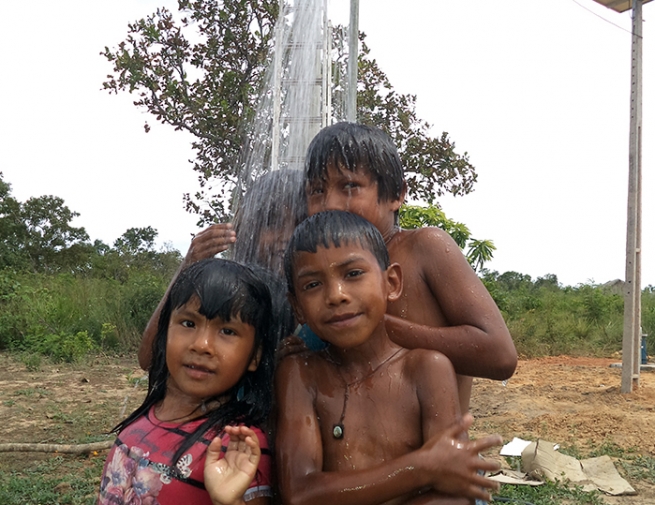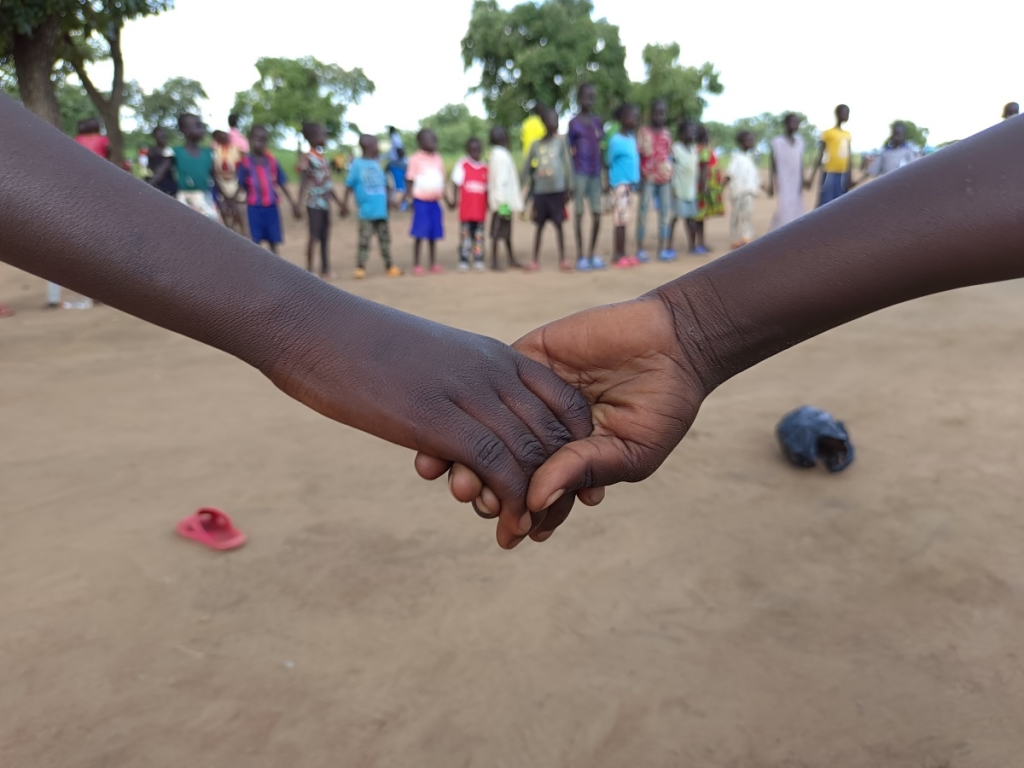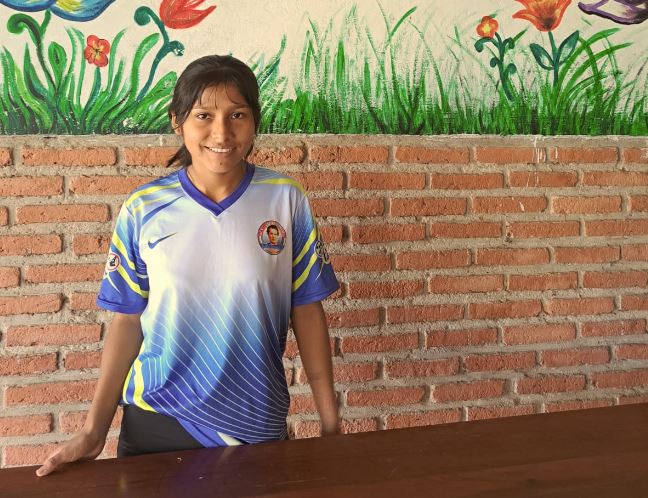OLYMPICS IN BRAZIL: Salesian Missions Highlights Programs in Brazil That Provide Poor Youth, Families Hope for a Better Future

(MissionNewswire) Salesian missionaries have a long history of providing education, workforce development and social services to poor youth and their families in Brazil. As all eyes turn to Rio de Janeiro for the Summer Olympics 2016, missionaries have been living and working among the city’s people caring for those most in need.
The country has faced enormous challenges. While Brazil has one of the strongest economies in Latin America and is an important agricultural and industrial power in the region, just more than 21 percent of Brazilians live in poverty and 4.2 percent live in extreme poverty, according to a UNESCO report. Brazil is making positive changes but there are still large gaps between the poor and the rich. Inequalities remain in access to education and educational efficiency. These inequalities are greatest for children and youth who are poor, live in rural areas or who have an incomplete compulsory education.
One Salesian program making a significant difference is the Sports for Peace program operated at the Mama Margaret Salesian Youth Center in Niterói, a municipality of the state of Rio de Janeiro. The Sports for Peace program, the third of its kind in Brazil, is made possible through a collaboration between the Salesian Missions office in Madrid and the Real Madrid Foundation and benefits close to 200 youth from the most disadvantaged areas around Rio de Janeiro. Many of the boys participating in the program live in the slums and once had very little hope for the future.
The program’s motto is “They play, we educate” and participants receive nutritional, family and psychological support, regular health checkups and the opportunity to participate in social and educational workshops, gymnastics, crafts, reading and citizenship activities. Training sessions on topics such as health, hygiene, values and the prevention of alcohol, tobacco and drug abuse are also provided. Outside of normal school hours, participants in the program receive sports training by coaches qualified by the Real Madrid Foundation.
“Sports programs teach youth both on and off the field,” says Father Mark Hyde, the executive director of Salesians Missions, the U.S. development arm of the Salesians of Don Bosco. “Learning and playing team sports encourages leadership skills as well as teaches youth to work as part of a team. Students also learn important social skills and have opportunities for growth and maturity.”
The sports program helps Salesian students on and off the field. Two former Salesian students from Brazil are Olympians. César Cielo Filho, a Brazilian competitive swimmer, won a gold medal at the 2008 Summer Olympics in the 50-metre freestyle competition, which is Brazil’s only Olympic gold in swimming to date. Oscar Daniel Bezerra Schmidt, a retired Brazilian professional basketball player, played in five Summer Olympics and was the top scorer in three of them.
Salesian programs are life-changing for the youth in their programs and in the communities in which they serve. Salesian Missions is proud to highlight other programs helping to break the cycle of poverty for poor youth and their families in Brazil and provide hope for a better future.
SUPPLYING FRESH CLEAN WATER
The Traveling Missionary Support Program, an initiative by Salesian missionaries, has built more than 250 wells in Brazil in the last several years. The program, which is based in Mato Grosso, a large state in west-central Brazil largely covered with Amazon rainforest, wetlands and savanna plains, supports local communities and Salesian programs in the rural villages through machine maintenance, the construction and maintenance of hydropower plants, and most recently, has engaged in the construction of wells in areas that need a clean water supply. The program supports the work of Salesian programs that focus on native populations especially the Xavantes and Bororo tribes.
YOUTH PROGRAMS
Since 2005, the Salesian Youth Ministry in Brazil-Recife Province has held summer camp programs for poor youth. Each year in Recife Province about 30 camps are organized for thousands of youth. Close to 1,000 volunteer leaders are involved in the development and execution of the camps, including many Salesians. In 2016, new camps were organized in locations where previously no camps existed, such as in Salvador de Bahia where 30 youth between the ages of 12 and 14 years participated and in Carpina, Pernambuco where 40 youth organized a camp for 250 children. Three hundred young people attended camp in Juazeiro, Ceará and close to 400 in João Pessoa, Paraíba.
In addition, Don Bosco City in Corumbá in its more than 50 year history has worked with close to 30,000 youth providing training and education. Many of its students remain for 10 years or more to continue their schooling. At the end of their studies, they often receive ongoing academic support throughout their time at university and if needed, family assistance after that. A very strong bond is created between the Salesian-run program’s staff and the youth it serves.
Every day nearly 3,000 youth receive education and training services at Don Bosco City. There are about 2,000 students attending the primary and middle schools and 500 students enrolled in vocational training.
Another 300 or more youth participate in the social welfare services offered and are enrolled in the Happy Youngsters Project, which was initiated to serve those youth who return home from school to an empty house. Without afterschool care, these youth are more vulnerable to spending time on the streets.
SERVICES TO STREET CHILDREN
At the Salesian Mission Community Center in Porto Alegre, street children receive three nutritious meals a day, clean clothing, medical care, schooling and a safe place to get much needed rest. And at the Salesian Center in the city of Abaetetuba, abandoned and at-risk child and youth can take part in wide variety of healthy and productive activities. The Center includes a recreation facility where children are able to participate on teams, make friends and gain a sense of accomplishment.
EDUCATON
The Salesian School of São José was opened in 1936 to provide agricultural education to disadvantaged youth. Today, the school offers courses in mechanics, carpentry, shoemaking, tailoring, printing and agriculture. The broader Salesian educational community offers a high school, technical school, and university classes as part of UNISAL, the Salesian Central University in São José.
The Centro Salesiano do Menor Vocational School in Porto Velho, Brazil, which started in 1994, takes students from poor income families from all of the city and provides them the skills needed to find and retain long-term stable employment. Salesian missionaries have the main parish of Nossa Senhora de Fatima that is located next to the vocational school and they also have four other chapels where they provide services.
###
Sources:
ANS – Brazil – Opening of International Olympic Games
Salesian Missions – Brazil
Newswire – Students Participating in Salesian-run Sports for Peace Program Awarded Trip to Madrid, Spain
World Bank – Brazil




